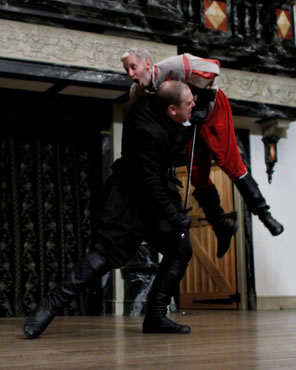A Conversation with King Richard III and Queen Margaret
[Return to previous page]
Your introduction as Richard was the way you killed Somerset. Were you thinking that this is going to be a big Richard moment when you actually did the killing of Somerset, or did you just want to make it as fantastic as you could?

Richard (Benjamin Curns) makes a lasting first impression in the American Shakespeare Center production of Henry VI, Part Two, when he kills Somerset (Ben Jones) with high-flinging violence. The two actors choreographed the stunt themselves. Photo by Tommy Thompson, American Shakespeare Center.
BEN: No, that just came from the fact that it was me and Bob, and Bob was so much smaller than me. Bob was like, "There's got to be something we can do to take advantage of the difference between the two of us." But it was a happy accident that once we finished it, we did both know that, A), we did take advantage of the difference in our body types, but B), he also said, "You've done a great thing because you just said to everybody, 'Get used to this face and get used to what you just saw happen to this guy because I'm going to be doing it for the next two years.' There's a lot more bodies to be found on this pile." [Laughter]
It goes back to what I was saying about doing Richard now. Now, what I think is important about that moment is how it relates to his relationship with his father and how Richard needs that kill, he needs to show his father that.
What about in Part Three? Would you go back and do a different reading on something because of what you learned in Richard III?
BEN: Um, probably. Probably, um [long pause]. Certainly the scenes that Richard is in with Elizabeth. There aren't many, there's just two. But, I'm wondering now having done Richard III if he actually does think Elizabeth is that beautiful or if he's just like, "Why is my brother wasting time with this commoner? This is exactly the kind of behavior I would expect out of him." I don't know.
In that one scene, you and Clarence are off to the side—
BEN: Snickering. Making jokes at [Edward's] expense.
I think the biggest thing I would take into account is in that first scene with Margaret in Richard III, he brings up to her, "If anyone cursed you it was my father cursed you when you were torturing him." And [Richard] makes sure that everybody in the court knows that, in case you forgot, this is what she did. She didn't kill him valiantly on the battlefield. She hunted him down like a wounded animal with five of her friends and then they tortured him. They wiped the blood of his son on him to let him know they killed him.
And everybody joins in condemning Margaret.
BEN: Right. But what Richard leaves out is that the battle happens in large part because Richard convinced his father to fight that battle. He said, "We shouldn't wait. We should just go and fight this battle right now." Now, Margaret is closing in anyway, but York says, "I don't have the men to encounter a force like this." Richard tells his father, "We shouldn't be afraid. A woman is general. We've got this. Let's go do this." So, I feel like in Richard III, as he's laying out all these awful things that Margaret did to his father, and she did do them, I do think that Richard is walking around going [to himself], “You told your dad to go to battle that day even after he, having a smarter, more experienced, better tactical mind, told you this is not a battle we can win, you convinced him otherwise. And now his death is kind of on you. A little bit. A little bit."
SARAH: A little bit.
BEN: That would ruin a guy's mind, I think. That would ruin somebody's mind.
Especially Richard's.
SARAH: Yeah.
BEN: A guy who's already twisted in more ways than one.
SARAH: But who loved and respected his father.
BEN: That's my take on it. My take on it is that he adores his father and he wanted nothing more than his dad to adore him, and I think his dad did adore him. And much like when Edward dies and Elizabeth is all alone, when York dies there's no one who loves Richard. Certainly not his other parent.
SARAH: No.
That was going to be my next question. You say his father adored him, but his mother didn't like him much.
SARAH: No.
Just because of the hard childbirth or was he that wicked a kid?
SARAH: Yeah, there was hard childbirth, but then [the Duchess says], "your childhood was terrible, your puberty was terrible, as a grown man you're terrible." She doesn't like him at all. I don't think she's shown that boy love like a mother should.
BEN: My take on it is always that she's married to Richard of York who tells her that he has a better claim to the throne than Henry does and that one day they're going to be the royal family. And then she's got this embarrassment, this runt of the litter that she would really just like to hide away. She doesn't want foreign dignitaries to see that he's a member of their family, because they're all going to ask her, "What's wrong with you that you gave birth to something like this?" That's my take on it, and all that frustration she takes out on him. But it's got to be counterbalanced by the fact that his father does not say those things. He does not say you were a bad kid or as an adult you have proven yourself to be—and Shakespeare can write those speeches if he wants, you know.
That's how you make a crazy person. He's got one parent telling him you're in the best family in this country. Your blood is royal and you are better—
SARAH: You are worthy.
BEN: —than everybody else. Better. Not higher, you're better. God wanted this family to be royal, and you're of that, despite your physical things. Don't ever forget that you're in the best family in England. Then his other parent is saying you're an embarrassment to this family and you don't belong in this family and you should be ashamed of yourself. Even the last thing she says is shame. “Shame serves thy life and doth thy death attend.” You should be ashamed of yourself the way you've conducted yourself. He probably should, but… [Laughter]
But I feel like that must be so weird to be brought up with that dichotomy.
Somebody taught him to be the best warrior in that whole family.
BEN: I think that it was the one thing that he knew he could be good at, and that he didn't have to be good looking in order to know how to do well. He knew that he could make a reputation that way. But, again, what does that do to somebody's mind? Like, "What is the best thing you're good at?" "F------ guys up. I could make a mess of your face."
Tony Soprano.
BEN and SARAH: Yeah.
BEN: That's why I thought it was really important in Richard III, and I might have been overanalyzing it, but he's got that line where he says “I'll entertain a score or two of tailors to study fashions to adorn my body.” I start the play in the same military uniform that he wore in Henry VI Three. I always thought that was such a cool line where he was like, "This isn't going to work anymore. The war is over, you look like you're clinging to your past. It's time to go forward, Richard, look like a politician, that's what you want to be." So he does. He puts a tie on and vest, some nonmilitary-type clothes. But then when everything goes all to hell, and they're like, "You're going to have to fight this guy Richmond," even after all the ghosts visit him he says, "I probably won't win tomorrow, but at least I'm back to doing something I'm good at. Because I'm a crap king."
I felt the same way when I played Macbeth here. He so thought that being king would be the bee's knees, and he's terrible at it. But when Malcolm and everybody start to invade, he's like, "At least I'm actually more comfortable with guys swinging axes at my head, I know how to deal with that. I've got counters for that. What I can't deal with is my own people saying, 'I'm not going to follow your orders or you should think about your morals, dude.'" [Laughter]
[To continue the interview, click here] [For a PDF of this interview, click here]



 Find additional Shakespeareances
Find additional Shakespeareances